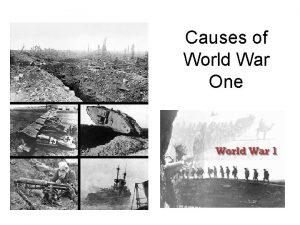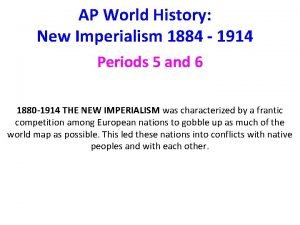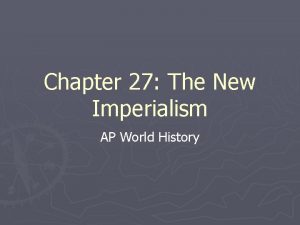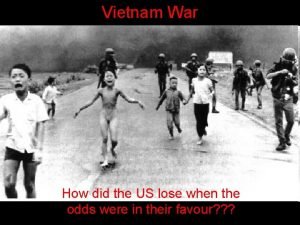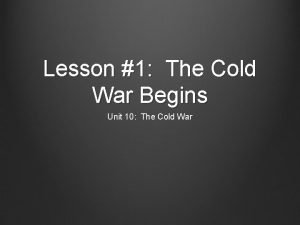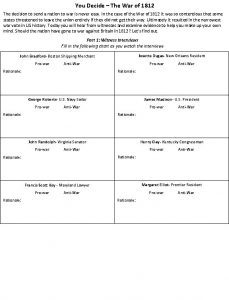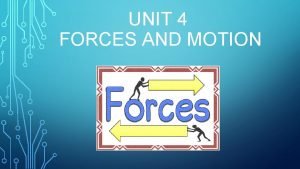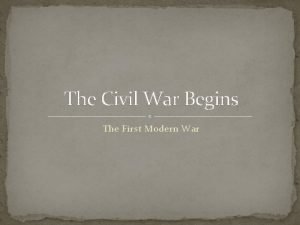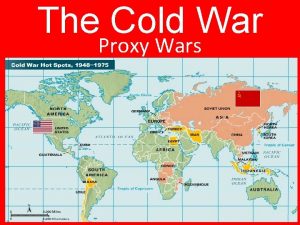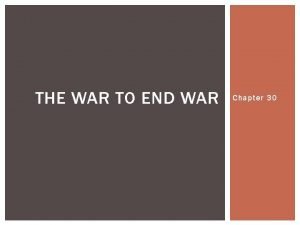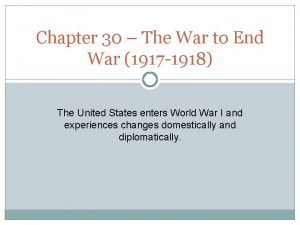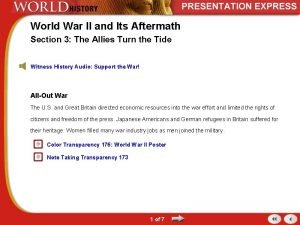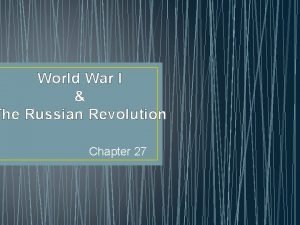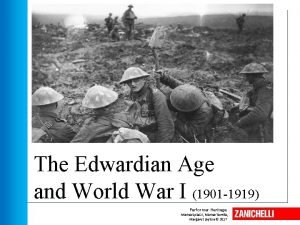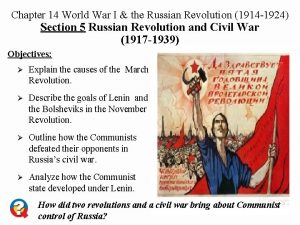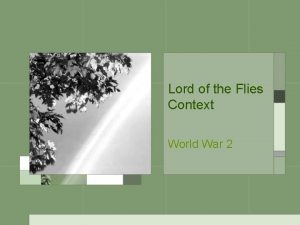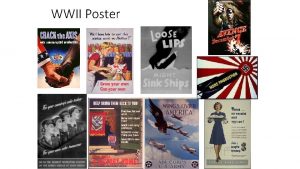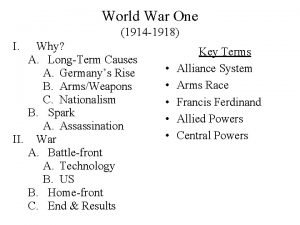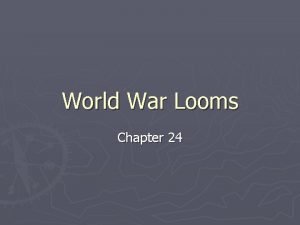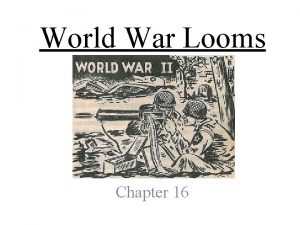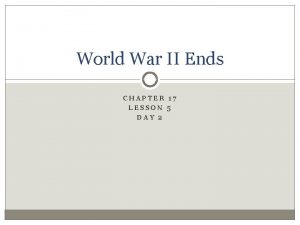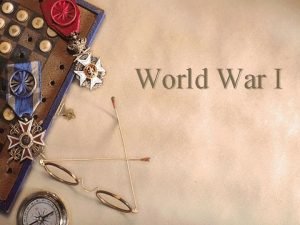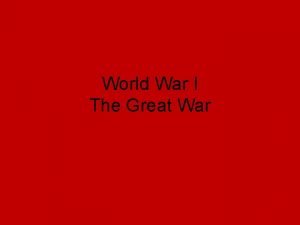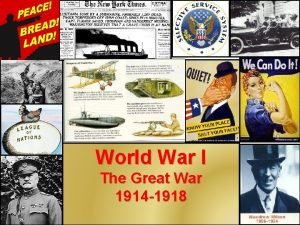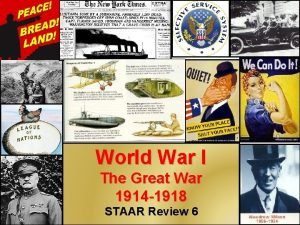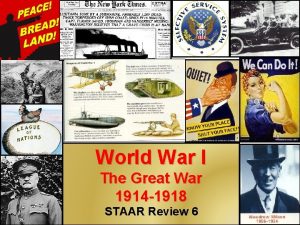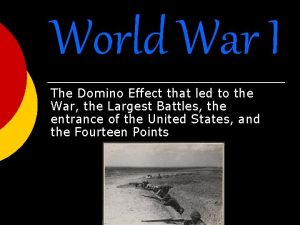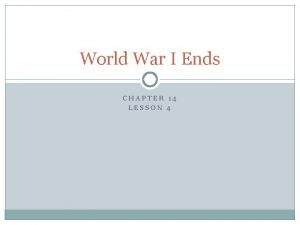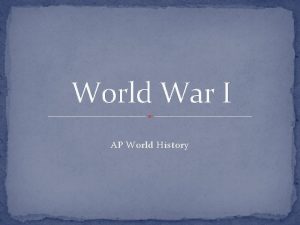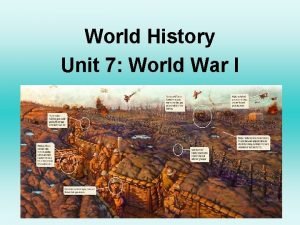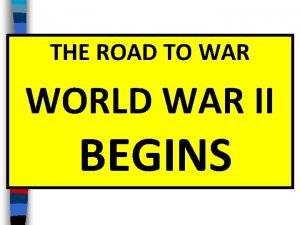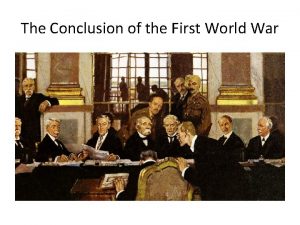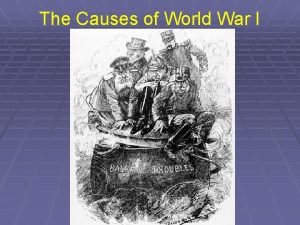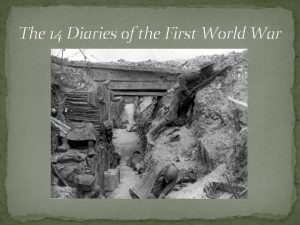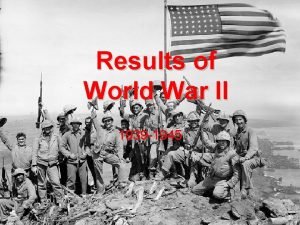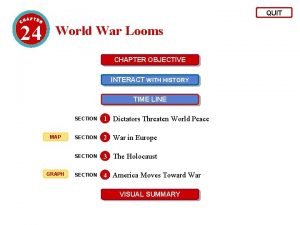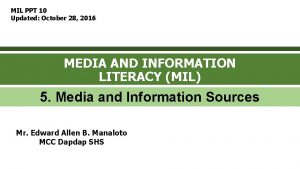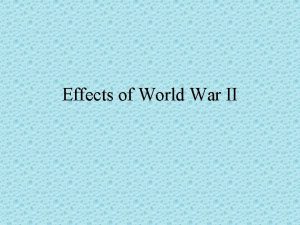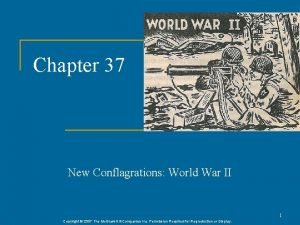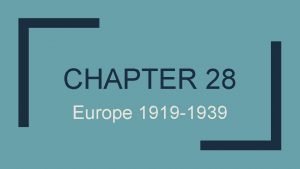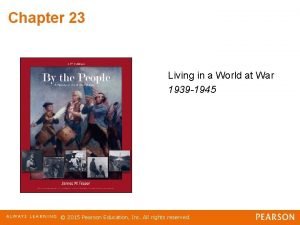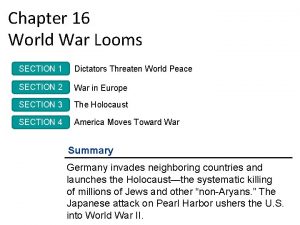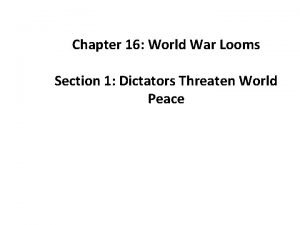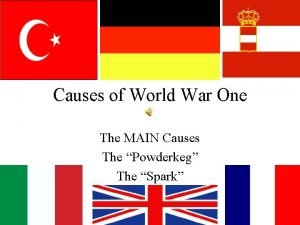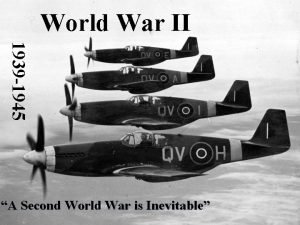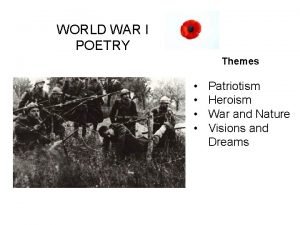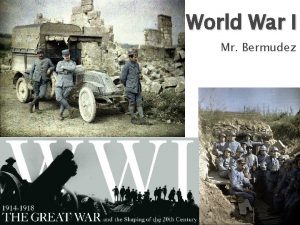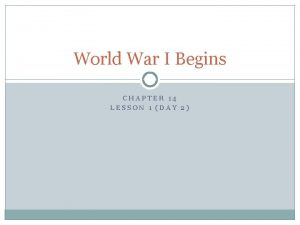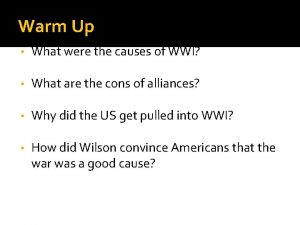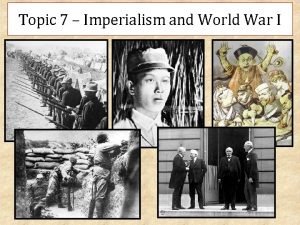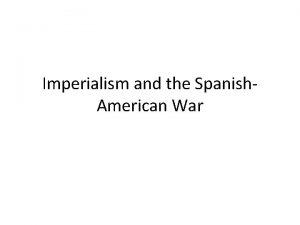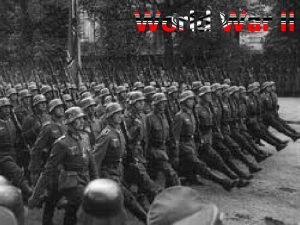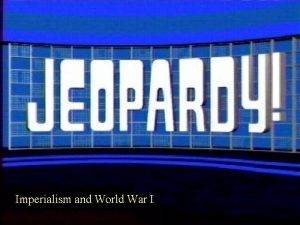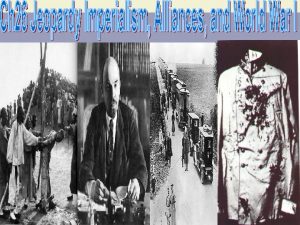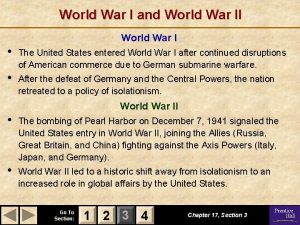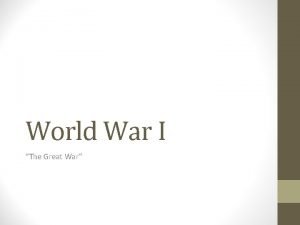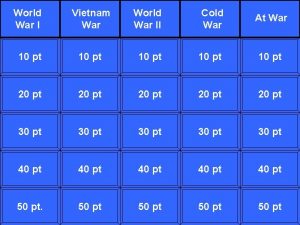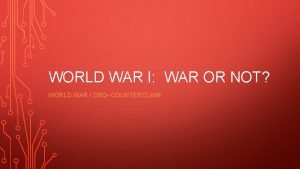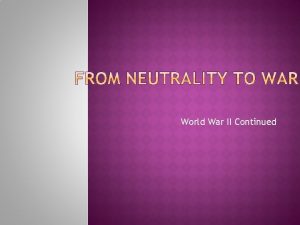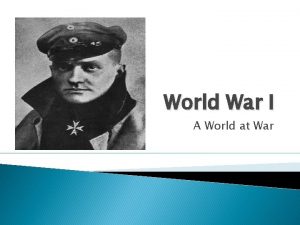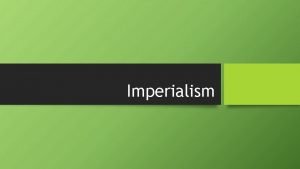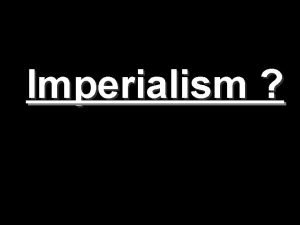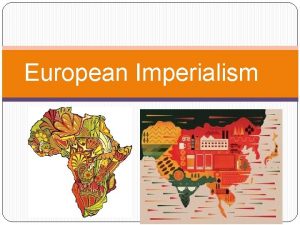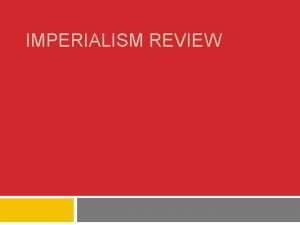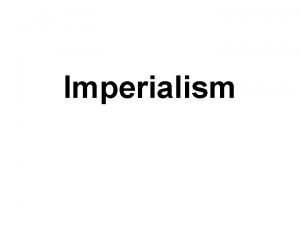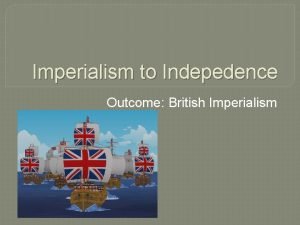Topic 7 Imperialism and World War I Imperialism
































































- Slides: 64

Topic 7 – Imperialism and World War I

Imperialism: the policy in which stronger nations extend their economic, political, and military control over weaker countries Factors fueling American imperialism: -desire for military strength -thirst for new markets -belief in cultural superiority

Desire for military strength: -Other nations establishing a global military presence American leaders advised the U. S. build up its own military strength -Admiral Alfred Mahan urged government officials to build up naval power in order to compete with other powerful nations (The Influence of Sea Power Upon History, 16601783)

Thirst for new markets: -advances in technology overproduction of goods -needed raw materials and new markets Belief in cultural superiority: -some combined Social Darwinism (free-market competition would lead to survival of the fittest) with a belief in racial superiority of Anglo-Saxons -the U. S. had a responsibility to spread Christianity and “civilization” to the world’s “inferior peoples”

Alaska (1867): “Seward’s Folly”/”Seward’s Icebox” • William Seward – early supporter of American expansion • Purchased from Russia for $7. 2 million • Nicknamed “Seward’s Icebox” or “Seward’s Folly” • 2 cents an acre for land rich in timber, minerals, and oil

Hawaii (1898) • 1790 s – American merchants began stopping on the way to East Indies and China • 1820 s – Yankee missionaries founded Christian schools and churches on the islands their children and grandchildren became sugar planters • 1900 – foreigners and immigrant laborers outnumbered native Hawaiians 3: 1

Hawaii (1898) I, Liliuokalani, . . . do hereby solemnly protest against any and all acts done against myself and the constitutional government of the Hawaiian Kingdom. . Now, to avoid any collision of armed forces and perhaps the loss of life, I do under this protest. . . yield my authority until such time as the Government of the United States shall. . . undo the action of its representatives and reinstate me in the authority which I claim as the constitutional sovereign of the Hawaiian Islands. ” —quoted in Those Kings and Queens of Old Hawaii • 1890 – Mc. Kinley Tariff eliminated dutyfree status of Hawaiian sugar more competition in the American market • American planters called for annexation • 1887 – U. S. had built naval base at Pearl Harbor • 1887 – Hawaii’s King Kalakaua had been strong-armed into limiting voting rights to only wealth landowners • 1891 - Kalakaua died, his sister Queen Liliuokalani came to power with a “Hawaii for Hawaiians” agenda • Business groups overthrew her with the help of marines; gov’t set up under Sanford B. Dole • August 12, 1898 – Hawaii became an American territory (although Hawaiians never had the chance to vote) • Became a state in 1959

The Spanish-American War (1898) (2: 30 -43: 15) Summarize the main Political, Economic, Social and Cultural CAUSES of the Spanish-American War from this section. Identify each fact as P, E, S, C or a combination of these.

The Spanish-American War (1898)

The Spanish-American War (1898) War in the Philippines • April 20 – war declared on Spain • April 30 – Commodore George Dewey gave the command to open fire on the Spanish fleet at Manila, the Philippine capital • Within hours, every Spanish ship was destroyed • Dewey had support of Filipinos who wanted freedom from Spain; over 2 months, 11, 000 Americans joined forces with rebels (led by Emilio Aguinaldo) • August – Spanish troops in Manila surrendered

The Spanish-American War (1898) War in the Caribbean • Began with naval blockade of Cuba • Dewey’s victory superiority of U. S. naval forces; however, army was ill-prepared (small professional fighting force supplemented by inexperienced volunteers) • June 1898 – landed in Cuba army of 17, 000 included four African. American regiments and the Rough Riders – volunteer cavalry under command of Leonard Wood and Teddy Roosevelt • July 1 – first land battle at Santiago; victory on Kettle Hill by Rough Riders and two African American regiments cleared way for an infantry attack on strategically important San Juan Hill • TR declared hero of San Juan Hill (even though he played only a minor role) • Spanish fleet tried to escape American blockade of the harbor of Santiago naval battle that followed ended in destruction of the Spanish fleet • American troops invaded Puerto Rico on July 25

The Spanish-American War (1898) Treaty of Paris • Armistice signed on August 12 (ended 15 weeks of fighting) • Treaty negotiated December 10, 1898 • Spain freed Cuba, turned over Guam in the Pacific and Puerto Rico to the U. S. • Sold Philippines to the U. S. for $20 million This lithograph criticizes American foreign policy in 1898. In the cartoon, Uncle Sam is riding a bicycle with wheels labeled “western hemisphere” and “eastern hemisphere. ” He has abandoned his horse, on whose saddle appears “Monroe Doctrine, ” because the horse is too slow.

Cuba and the United States • Treaty of Paris guaranteed Cuba its independence • Occupied by American troops after the war provided food and clothing, helped farmers put land back into cultivation, organized elementary schools, helped eliminate yellow fever • Platt Amendment (to new Cuban constitution – army wouldn’t withdraw until it was adopted) 1. Cuba couldn’t make treaties that might limit its independence 2. the U. S. reserved the right to intervene 3. Cuba was not to go into debt that the gov’t couldn’t repay 4. the U. S. could buy or lease land for naval and refueling stations • Cuba became a U. S. protectorate

Ruling Puerto Rico • Occupied by the military during the Spanish-American War • Puerto Rico’s importance maintain presence in Caribbean, protect future Panama Canal • 1900 – Foraker Act passed ended military rule, set up civil government • Gave the President the power to appoint Puerto Rico’s governor and members of the upper house of its legislature • 1901 – Supreme Court ruled that the Constitution didn’t automatically apply to people in acquired territories • Citizenship granted to Puerto Ricans in 1917

Filipinos Rebel 1: 20: 561: 43: 53 The Philippine-American War • What were its root causes? • Discuss the debate that ensued in the Senate about the annexation of the Philippines and the creation of an overseas empire when voting to ratify the Treaty of Paris. Arguments for? Against? • How were the Filipinos treated by the Americans during the war? • Results of the war?

American Interest in China • Spheres of influence carved out by France, Germany, Britain, Russia, and Japan • 1899 – John Hay issued Open Door notes – letters addressed to leaders of imperialist nations proposing that nations share their trading rights with the U. S. (creating an “open door”) • Reluctantly accepted • Boxer Rebellion indication that the Chinese wanted foreigners out How did the Open Door policy reflect American beliefs about the U. S. industrial capitalist economy? 1. Growth of the U. S. economy depended on exports 2. The U. S. had a right to intervene abroad to keep foreign markets open 3. They feared the closing of an area to American products, citizens, or ideas threatened U. S. survival


Teddy Roosevelt and the Panama Canal • Why did Roosevelt feel we needed a canal? • How did he acquire the land necessary to build it? • What challenges were faced in building the canal?

The Panama Canal

The Panama Canal Timelapse

“Speak softly and carry a big stick; you will go far. ” Teddy Roosevelt

Brazil Philippines S. America Columbia Europe

Presidential Policies in Latin America Teddy Roosevelt: “Big Stick Policy” Woodrow Wilson: “Moral Diplomacy” William H. Taft: “Dollar Democracy”

Review: Causes of WWI Briefly describe how each of the following led to the outbreak of World War I: Nationalism: Imperialism: Alliances: Militarism: Assassination of Archduke Franz Ferdinand:

U. S. Neutrality in 1914 The effect of the war upon the United States will depend upon what American citizens say and do. Every man who really loves America will act and speak in the true spirit of neutrality, which is the spirit of impartiality and fairness and friendliness to all concerned. The spirit of the nation in this critical matter will be determined largely by what individuals and society and those gathered in public meetings do and say, upon what newspapers and magazines contain, upon what ministers utter in their pulpits, and men proclaim as their opinions upon the street. The people of the United States are drawn from many nations, and chiefly from the nations now at war. It is natural and inevitable that there should be the utmost variety of sympathy and desire among them with regard to the issues and circumstances of the conflict. Some will wish one nation, others another, to succeed in the momentous struggle. It will be easy to excite passion and difficult to allay it. Those responsible for exciting it will assume a heavy responsibility, responsibility for no less a thing than that the people of the United States, whose love of their country and whose loyalty to its government should unite them as Americans all, bound in honor and affection to think first of her and her interests, may be divided in camps of hostile opinion, hot against each other, involved in the war itself in impulse and opinion if not in action. Such divisions amongst us would be fatal to our peace of mind and might seriously stand in the way of the proper performance of our duty as the one great nation at peace, the one people holding itself ready to play a part of impartial mediation and speak the counsels of peace and accommodation, not as a partisan, but as a friend. I venture, therefore, my fellow countrymen, to speak a solemn word of warning to you against that deepest, most subtle, most essential breach of neutrality which may spring out of partisanship, out of passionately taking sides. The United States must be neutral in fact, as well as in name, during these days that are to try men's souls. We must be impartial in thought, as well as action, must put a curb upon our sentiments, as well as upon every transaction that might be construed as a preference of one party to the struggle before another. Woodrow Wilson, Message to Congress, 63 rd Cong. , 2 d Sess. , Senate Doc. No. 566 (Washington, 1914)

U. S. Neutrality in 1914 Verse 1 Ten million soldiers to the war have gone, Who may never return again. Ten million mother's hearts must break For the ones who died in vain. Head bowed down in sorrow In her lonely years, I heard a mother murmur thru' her tears: Verse 2 I didn't raise my boy to be a soldier, I brought him up to be my pride and joy. Who dares to place a musket on his shoulder, To shoot some other mother's darling boy? Let nations arbitrate their future troubles, It's time to lay the sword and gun away. There'd be no war today, If mothers all would say, "I didn't raise my boy to be a soldier. " Verse 3 What victory can cheer a mother's heart, When she looks at her blighted home? What victory can bring her back All she cared to call her own? Let each mother answer In the years to be, Remember that my boy belongs to me!

Immigration: Ethnic Groups in America Swiss Polish Swedish Dutch Spanish Mexican Hungarian English, Scottish, Welsh Russian French Italian Greek German Irish Japanese

Divided Loyalties: Could the U. S. really stay neutral? • Socialists criticized the war as a capitalist and imperialist struggle between Germany and England to control markets and colonists • Pacifists believed war was evil; the U. S. should set an example of peace to the world • Naturalized U. S. citizens still had ties to the nation from which they had emigrated • Many Americans felt close ties to Britain sympathy for them and anger towards Germany • Economic ties with Allies far stronger than with Central Powers

U. S. Entry into WWI Causes of U. S. Entry: Read each document provided. For each, explain what it says and the reason it shows for U. S. involvement/entry into WWI. Be as specific as possible.

Reasons for U. S. Entry?

War Declaration (0: 49)

Wilson’s Reasons for War 1) The Zimmerman Telegram showed that the Germans were not trustworthy and would eventually go to war with the United States. 2) Armed neutrality could not adequately protect American shipping. 3) The democratic government in Russia after the revolution in March 1917 proved to be more acceptable as an ally than the Tsarist government of Nicholas II. 4) He was convinced that the United States could hasten the end of the war and ensure a major role for itself in designing a lasting peace.

Mobilizing for War Verse 1 Most ev’ry fellow has a sweetheart Some little girl with eyes of blue My daddy also had a sweetheart And he fought to win her too There'll come a day when we must pay the price of love and duty Be there staunch and true CHORUS It’s time for ev’ry boy to be a soldier To put his strength and courage to the test It's time to place a musket on his shoulder And wrap the Stars and Stripes around his breast It’s time to shout those noble words of Lincoln And stand up for the land that gave you birth “That the nation of the people by the people for the people Shall not perish from the earth”

Mobilizing for War Raising an Army: The Selective Service Act (May 18, 1917) • Draft was necessary. • By the end of the war, 24, 231, 021 men had been registered and 2, 810, 296 had been inducted. • In addition, about 2 million men & women volunteered.

Mobilizing for War American Expeditionary Force (AEF) • Soldiers & marines sent to France under the command of Major General John J. Pershing • AEF increased to over 2 million by November 1918.

Over There Johnnie, get your gun, Get your gun, get your gun, Take it on the run, On the run, on the run. Hear them calling, you and me, Every son of liberty. Hurry right away, No delay, go today, Make your daddy glad To have had such a lad. Tell your sweetheart not to pine, To be proud her boy's in line. (chorus sung twice) Johnnie, get your gun, Get your gun, get your gun, Johnnie show the Hun Who's a son of a gun. Hoist the flag and let her fly, Yankee Doodle do or die. Pack your little kit, Show your grit, do your bit. Yankee to the ranks, From the towns and the tanks. Make your mother proud of you, And the old Red, White and Blue. (chorus sung twice) George M. Cohan Chorus Over there, over there, Send the word, send the word over there That the Yanks are coming, The drums rum-tumming Ev'rywhere. So prepare, say a pray'r, Send the word, send the word to beware. We'll be over, we're coming over, And we won't come back till it's over Over there.

Mobilizing for War Mobilizing the Home Front: War Industry Board (WIB) • • Headed, by Bernard Baruch, the WIB: 1) Allocated raw materials 2) Standardized manufactured products 3) Instituted strict production & purchasing controls 4) Paid high prices to businesses for their products American industry was just beginning to produce heavy armaments when the war ended.

Mobilizing for War The Food Administration: • Headed by Herbert Hoover Ø Fixed high prices to encourage the production of wheat, pork, and other products. Ø Encouraged the conservation of food (“wheatless, ” “sweetless, ” “meatless, ” and “porkless”) Ø Food exports by 1919 were almost triple those of the prewar years & farmers’ incomes rose almost 30%.

Mobilizing for War The Fuel Administration was established in August 1917: Ø “Fuelless Mondays” > for nonessential industries to conserve coal Ø “Gasless Sundays” > for automobile owners to save gasoline. Gasless Sunday in Market Square c. 1918 (Chicopee, MA)

Mobilizing for War • The U. S. Railroad Administration was established: Ø The government took over & operated all the railroads in the nation. Ø The government paid the owners rent for their use of their lines. § Spent over $500 million on improved tracks & equipment. • The U. S. Shipping Board was established to buy, build, lease, and operate merchant ships for the war effort.

Mobilizing for War Finance & Taxation • The war cost about $33 billion. • The U. S. government raised about $10. 5 billion in taxes & borrowed the remaining $23 billion. • The Revenue Act of 1918 imposed a personal income tax • Liberty Bonds: Ø Public pressure, peer pressure & employer pressure was used on citizens to buy war bonds, which covered a major part of the borrowing.

Mobilizing for War The Committee on Public Information (CPI) • Journalist George Creel headed the CPI. • Established a successful system of voluntary censorship of the press & a propaganda campaign to build support for the American cause. War Labor Board (WLB) • Created to prevent strikes & work stoppages under the direction of former President William Howard Taft. • It prohibited strikes, but also encouraged higher wages, the 8 -hour day, and unionization (union membership doubled during the war from 2. 5 million to about 5 million. )

Mobilizing for War Hysteria • The American Protective League (25, 000 members) Ø publicly humiliated people accused of not buying war bonds Ø persecuted, beat, and sometimes killed people of German descent. • As a result of the CPI and vigilante groups: Ø German language instruction in schools was banned Ø German music was banned in many areas (i. e. Bach & Beethoven) Ø German measles became “liberty measles” Ø Sauerkraut became “liberty cabbage” Ø Pretzels were banned in some cities ØIn rare occasions, dachshunds were stoned to death • Anti-German hysteria was far worse in the U. S. than either Britain or France.

Mobilizing for War

The War Encourages Social Change • W. E. B. Du. Bois African American support for the war would strengthen calls for social justice • William Monroe Trotter (founder of the Boston Guardian) victims of racism shouldn’t support a racist government “That which the German power represents today spells death to the aspirations of Negroes and all darker races for equality, freedom and democracy… Let us, while this war lasts, forget our special grievances and close our ranks shoulder to shoulder with our own white fellow citizens and the allied nations that are fighting for democracy. ”

The War Encourages Social Change • WWI accelerated the Great Migration (about 500, 000 African Americans moved to the North and Midwest) • Reasons for black migration: escape racial discrimination, floods and droughts (ruined many of the South’s cotton fields), job opportunities due to the war and the drop in immigration

“Mr. President, why not make America safe for Democracy? ” (In 1917, there were race riots in 26 cities in the North & South, with the worst in East St. Louis, Illinois) President Woodrow Wilson The World Must Be Made Safe For Democracy? ”

The 369 th -Among the first regiments to arrive in France: the “Harlem Hellfighters” -All-black regiment under the command of mostly white officers -Remember Plessy v. Ferguson? Impact on African American soldiers? -380, 000 African Americans served in the wartime Army; 200, 000 of these were sent to Europe -More than half of those sent abroad were assigned to labor battalions, but they performed essential duties nonetheless, building roads, bridges, and trenches in support of the front-line battle -Roughly 42, 000 saw combat. -Fought in segregated units alongside the French Henry Johnson

The War Encourages Social Change What was the impact of WWI on women in the United States?

The War’s Impact on Civil Liberties The Espionage & Sedition Acts The Espionage Act of 1917 • Provided fines & imprisonment for people who: Ø made false statements which aided the enemy Ø incited rebellion in the military Ø obstructed recruitment or the draft The Sedition Act of 1918 • forbade any criticism of the U. S. government, flag, or uniform

The War’s Impact on Civil Liberties Schenck vs. United States (1919) Origins of the Case: Charles Schenck, an official of the U. S. Socialist Party, distributed leaflets that called the draft a “deed against humanity” and compared conscription to slavery, urging conscripts to “assert your rights. ” Schenck was convicted of sedition and sentenced to prison, but he argued that the conviction, punishment, and even the law itself violated his right to free speech. The Supreme Court agreed to hear his appeal. Question Presented: Whether Schenck’s First Amendment right to freedom of speech was violated when he was convicted of conspiring to obstruct the recruitment and enlistment of service. The Ruling: A unanimous court upheld his conviction, staring that under wartime conditions, the words in the leaflets were not protected by the right to free speech.

The War’s Impact on Civil Liberties • The Supreme Court’s opinion in the case, written by Justice Oliver Wendell Holmes, Jr. , has become famous as a guide for how the 1 st Amendment defines the right of free speech “The question in every case is whether the words used are used in such circumstances and are of such a nature as to create a clear and present danger that they will bring about the substantive evils that Congress has a right to prevent… Protection of free speech would not protect a man in falsely shouting ‘Fire!’ in a theatre and causing a panic. ”

Wilson Fights for Peace • January 18, 1918 – Wilson delivered “Fourteen Points” speech to Congress First Five Points – how to prevent another war: 1. No secret treaties 2. Freedom of seas for all 3. Tariffs/economic barriers lowered or abolished to foster free trade 4. Reduction of arms 5. Colonial policies should consider the interests of the colonial peoples as well as the imperialist powers Next Eight Points – boundary changes: • Provisions based on principles of self-determination “along historically established lines of nationality” Fourteenth Point – League of Nations • Creation of an international organization to address diplomatic crises like those that sparked the war


The Allies Reject Wilson’s Plan David Lloyd George (British Prime Minister) “Make Germany Pay” Georges Clemenceau (French premier) Determined to prevent future German invasions of France Vittorio Orlando (Italian Prime Minister) Wanted control of Austrianheld territory

Provisions of the Treaty • Est. 9 new nations and shifted the boundaries of other nations • Carved out five areas of the Ottoman Empire and gave them to France and Great Britain as mandates (temporary colonies) • Barred Germany from maintaining an army, had to return Alsace-Lorraine to France, had to pay reparations, lost colonial possessions in the Pacific

The Treaty’s Weaknesses • Humiliated Germany – war-guilt clause forced Germany to admit sole responsibility for starting the war • Russia lost more territory than Germany did – became determined to regain it • Ignored claims of colonized people for self -determination

Political Cartoon Analysis How do the following cartoons represent the opposition Wilson faced in Congress in order to ratify the Treaty of Versailles?




Opposing Viewpoints The United States Should Join the League of Nations (1919) James D. Phelan – Senator (D) from California The United States Should Not Join the League of Nations (1919) Lawrence Sherman – Senator (R) from Illinois

Wilson’s Refusal to Compromise • Had Wilson been more willing to accept a compromise on the League, the Senate might have approved the treaty • Delivered 34 speeches in 3 weeks (8, 000 mile tour), explaining why the U. S. should join the League • Oct. 2, 1919 – suffered a stroke • Senate rejected the treaty in both Nov. 1919 and March 1920 • Finally signed a separate treaty with Germany in 1921

Legacy of WWI on the United States and the World 1. Strengthened U. S. military and power of government 2. Accelerated social change 3. Propaganda provoked fears and antagonisms that didn’t go away 4. Europe – severely damaged social and political systems 5. Americans began calling WWI “the war to end all wars” 6. Treaty of Versailles solved nothing fueled desire by some to resume the fight
 Bosnian empire
Bosnian empire Old imperialism vs new imperialism
Old imperialism vs new imperialism Motives of old imperialism
Motives of old imperialism How to write a clincher sentence
How to write a clincher sentence Broad and specific topic examples
Broad and specific topic examples Toward civil war lesson 3 secession and war
Toward civil war lesson 3 secession and war Weak topic sentence examples
Weak topic sentence examples New imperialism definition ap world history
New imperialism definition ap world history New imperialism definition ap world history
New imperialism definition ap world history World history imperialism vocabulary
World history imperialism vocabulary James madison war at home
James madison war at home Vietnam war
Vietnam war The cold war lesson 1 the cold war begins
The cold war lesson 1 the cold war begins Presidential and radical reconstruction venn diagram
Presidential and radical reconstruction venn diagram Was josette dugas pro war
Was josette dugas pro war Ich war du warst er sie es war
Ich war du warst er sie es war Force and motion study jams
Force and motion study jams Civil war first modern war
Civil war first modern war Simple past bringen
Simple past bringen Proxy war cold war definition
Proxy war cold war definition Chapter 30 the war to end war
Chapter 30 the war to end war Chapter 30 the war to end war
Chapter 30 the war to end war World war ii and its aftermath section 1 quiz
World war ii and its aftermath section 1 quiz Chapter 27 world war 1 and the russian revolution
Chapter 27 world war 1 and the russian revolution From the edwardian age to the first world war
From the edwardian age to the first world war Chapter 14 world war 1 and the russian revolution
Chapter 14 world war 1 and the russian revolution Lord of the flies and world war 2
Lord of the flies and world war 2 Card stacking propaganda posters
Card stacking propaganda posters Results of the world war 1
Results of the world war 1 Chapter 16 world war looms vocabulary
Chapter 16 world war looms vocabulary Chapter 16 world war looms vocabulary
Chapter 16 world war looms vocabulary Lesson 5 world war ii ends
Lesson 5 world war ii ends Brainpop world war 2
Brainpop world war 2 Zimmerman telegram
Zimmerman telegram The 4 causes of ww1
The 4 causes of ww1 What was the cause of world war 1
What was the cause of world war 1 Cause of world war 1
Cause of world war 1 Ww1 domino effect
Ww1 domino effect Chapter 27 lesson 4 world war 1 ends
Chapter 27 lesson 4 world war 1 ends Total war world history definition
Total war world history definition Ww2 alliances
Ww2 alliances What is a thesis statement
What is a thesis statement Causes of world war 2
Causes of world war 2 Conclusion of first world war
Conclusion of first world war Long term causes of world war 2
Long term causes of world war 2 What was the cause of world war 1
What was the cause of world war 1 Arte 14 - diaries of world war i
Arte 14 - diaries of world war i Results of the world war 1
Results of the world war 1 Chapter 24 world war looms section 1 answers
Chapter 24 world war looms section 1 answers School uniform of sshs prior to the second world war
School uniform of sshs prior to the second world war Result of world war 2
Result of world war 2 Ww1 conclusion
Ww1 conclusion Chapter 37 new conflagrations world war ii
Chapter 37 new conflagrations world war ii Lesson 1 instability after world war i
Lesson 1 instability after world war i Chapter 24 world war looms section 1 answers
Chapter 24 world war looms section 1 answers Chapter 23 living in a world at war
Chapter 23 living in a world at war Chapter 16 building vocabulary world war looms
Chapter 16 building vocabulary world war looms Chapter 16 world war looms vocabulary
Chapter 16 world war looms vocabulary Cause of ww1
Cause of ww1 World war 2 facts
World war 2 facts 1945 world war ii
1945 world war ii Poem on online teaching
Poem on online teaching Who were the allies in ww1
Who were the allies in ww1 Lesson 1 world war 1 begins
Lesson 1 world war 1 begins New technology in wwi
New technology in wwi
